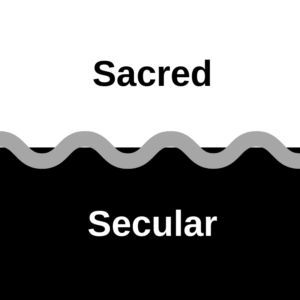
Author – Brian Hehn is the Director of The Center for Congregational Song
When the “other” sings the Gospel
As someone who is a life-long church musician but who cut(s) his teeth on Ben Folds Five, the Goo Goo Dolls, Nirvana, Ray Charles, The Beatles, and other secular pop/rock artists, I quickly became fascinated with the idea of sacred and secular. What makes a song sacred and what makes it secular? Can a sacred song be turned evil? Can a secular song be holy? I got to really dig into this topic during seminary when I began my formal theological training and was presented with various definitions of what the word “theology” means (thanks, Dr. Rebekah Miles of Perkins School of Theology!). This topic has continued to be one of my favorite subjects to dwell upon. Over the last decade I’ve realized how many things in my life have informed how I approach the topic, and that’s probably why I find it such a fascinating exercise to grapple with. Here are a few moments/ideas/circumstances that might help illustrate where I’m coming from:
Catechism
- I grew up Presbyterian (USA) and was formed through the catechism class during which we were introduced to the Westminster Shorter Catechism. The first question (and my favorite) is “What is the chief end of man?” The answer is “Man’s chief end is to glorify God, and to enjoy him forever.”
- The answer to this question was ingrained in me early in my life. And, I think, it’s the reason why I quickly see the holy in children playing in sprinklers on a hot summer’s day…or how sacred it can be to just laugh together with a group of friends. Enjoyment is a part of our highest calling to be a holy people.
Careers
- My dad is a physician. He heals people (and/or keeps them healthy) for a living. In his medical practice, he doesn’t do that through anointing or prayer. Rather, he heals people using science.
- As I grew up and learned about what he did, I also learned about why he was a physician. It quickly became clear that his job was a holy thing informed and guided by his faith in a God who wants humanity to be whole and healthy…not just in spirit, but in body and mind as well. His job was a sacred one, but not because he was talking about Jesus or God, but because he was living out his calling.
Broadway
- My favorite Broadway production is Les Misérables. I grew up listening to it, singing it, and learning how to play its songs on piano. It was one of the first shows I ever saw in a big theatre, and it was even quoted at my wedding. It’s not a sacred play…it’s not about God. It’s set during one of the French Revolutions and centers around the protagonist, an ex-convict turned mayor turned adopted father.
- While the play is certainly not a “sacred” play, it begins and ends with some stunningly sacred moments. Near the beginning, when Jean Valjean has yet to get on his feet, he steals from a priest. Instead of sending him back to jail, the priest sends him away with more silver than what had been stolen and a blessing to make a better life for himself. . Then, one of the last lines sung in the entire production is the phrase “to love another person is to see the face of God.” Forgiveness (from the priest) makes the entire plotline possible by giving Jean Valjean a chance to live out in the world. Love of his neighbor transforms Jean Valjean into the loving father and hero of the story.
Scripture
When I combine these life experiences with scripture, the line between secular and sacred continues to shift, morph, and sometimes even disappear.
The book of Esther
- The book of Esther, found in the Hebrew Bible (Christian Old Testament), is obviously “sacred,” right? It’s a part of scripture, for goodness sake! When I learned that God is never mentioned, I found that fact curious and instructive.
Mark, Chapter 7 – The Syrophoenician Woman
- In Mark 7 (and Matthew 15) we find the story of a Gentile (Syrophoenician) woman challenging Jesus when he would not heal her daughter. She was not Jewish, but because of her deep faith in Jesus, her daughter was healed. At that moment, it didn’t matter what religion she was. It only mattered that she believed Jesus could heal and bring wholeness.
Matthew 8 – “Lord, I am not worthy”
- I currently serve a Roman Catholic parish. It strikes me that every time they prepare to take communion, the last words used by the assembly are “Lord, I am not worthy to come under your roof; but only speak the word, and your servant will be healed”- an adaption from Matthew 8:8. The words are those of a Roman Centurion – once again, not one of Jesus’ disciples and not a Jew. He was an outsider, and yet his words are included in the Gospel and are now spoken weekly by millions of Christians around the world.
Bridging the Gap
So, here are some songs that bridge the gap of secular and sacred for me. Some mention God, others don’t. They don’t come from the church, but they do come from a place or speak of a place that I find sacred.
Bob Marley – One Love
One love, one heart, let’s get together and feel all right
Regina Spektor – Laughing With
No one’s laughing at God, we’re all laughing with God
Ben Folds – The Luckiest
I love you more then have ever found the way to say to you
Belinda Carlisle – Heaven Is A Place On Earth
In this world we’re just beginning to understand the miracle of living
Les Misérables – Epilogue
To love another person is to see the face of God


